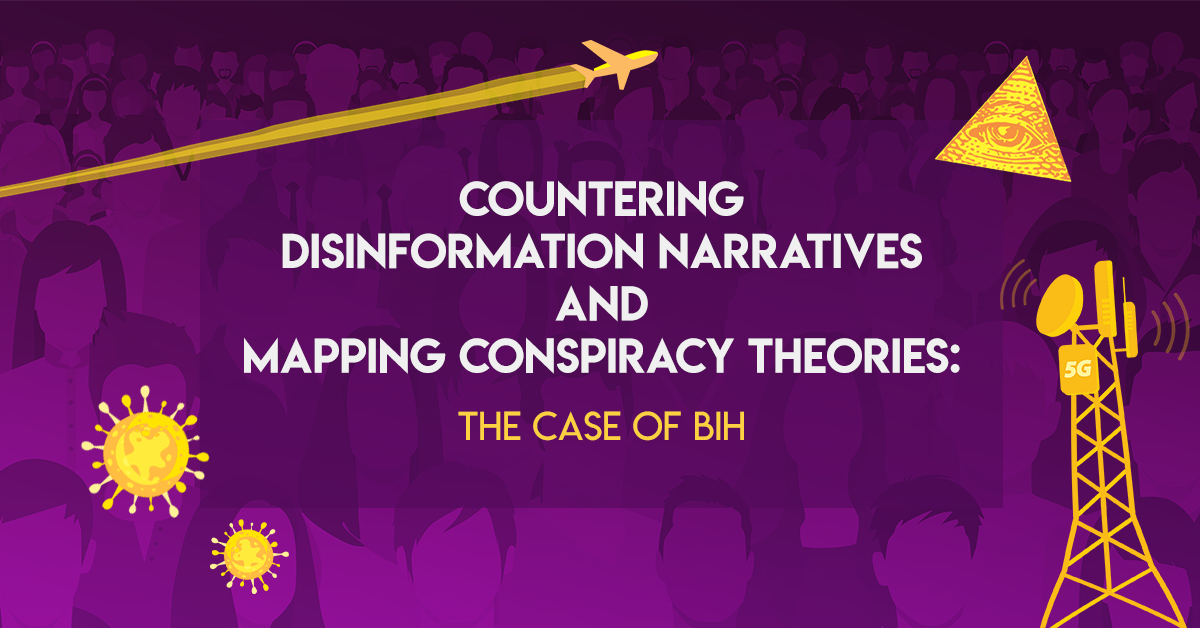Research on disinformation and conspiracy theories in BiH
Citizens’ Association “Zašto ne” from Sarajevo has presented the publication “Countering disinformation narratives and mapping conspiracy theories: The Case of BiH”.

The publication is the result of extensive research into beliefs in conspiracy theories and other complex disinformation narratives, with an emphasis on those targeting the pandemic and immunization against Covid-19.
The research was conducted through an online survey on a representative sample for the adult population in Bosnia and Herzegovina. Out of a total of 1,018 respondents, 51.1% (521) were women, 48.9% (497) men, with 50.8% of respondents from rural and 48.2% from urban areas.
According to the findings of this research, about half of the country’s population (47%) is mostly undecided when it comes to believing in conspiracy theories; about 29% strongly believe in them, and about 24% completely reject them. The tendency to believe in conspiracy theories is approximately the same among women and men and in both entities and Brcko District. The differences are clearly visible only in relation to age – belief in conspiracy theories is least present in the youngest population (18-24), while it is most present in people over 55 years of age.
Conspiracy theories about the Covid-19 pandemic have taken significant roots in society. Some of those narratives, such as the claim that the new coronavirus was “deliberately released into the population” or that hospitals inflated the number of Covid-19 deaths, were agreed with by almost three-quarters (over 73%) of the participants.
Misinformation about Covid-19 vaccines, especially those which originated on social networks and on the Internet in general, has also been widely accepted among the unvaccinated population. It can be concluded that they have had an impact on decision to refuse immunization against the disease. Nearly three-quarters of unvaccinated people believe that vaccines were not properly teste before public immunization began, and as many as 60% believed unfounded claims that they could endanger pregnancy.
The more outlandish narratives, such as those about microchips or parasites being present in vaccines, are less believed in the population. However, about 30% of unvaccinated people do agree with them, and more than half believe that Covid-19 vaccines can cause various diseases.
However, the research also shows that the rate of immunization against Covid-19 at the end of last year was indeed higher than what the official statistics estimated at the time (around 20%). About 53% of survey respondents said they had been vaccinated against the disease, 43% said they were not and 4% refused to answer.
The research examined a number of other correlations, and found that a person’s vaccination status can be linked to their age, education and degree of propensity to believe in conspiracy theories. One of the findings is that unvaccinated people more often rely on online sources of information about vaccines and the pandemic, most often using Facebook to that purpose.
“This research sought to provide empirical data on the content, scope, type and prevalence of beliefs in conspiracy theories and disinformation narratives, and to explore how these beliefs affect real-life decisions — specifically those related to health and immunization against Covid-19. We have also examined the relationships between such beliefs and a number of other variables, such as demographic characteristics, trust in institutions, choice of information sources and others. This research should therefore be useful to researchers from different disciplines. We especially hope that it will be of good use to policy makers and that its recommendations will help in creating effective strategies to combat disinformation in BiH and beyond,” said Tijana Cvjetićanin, head of research.
The full report is available at this link.